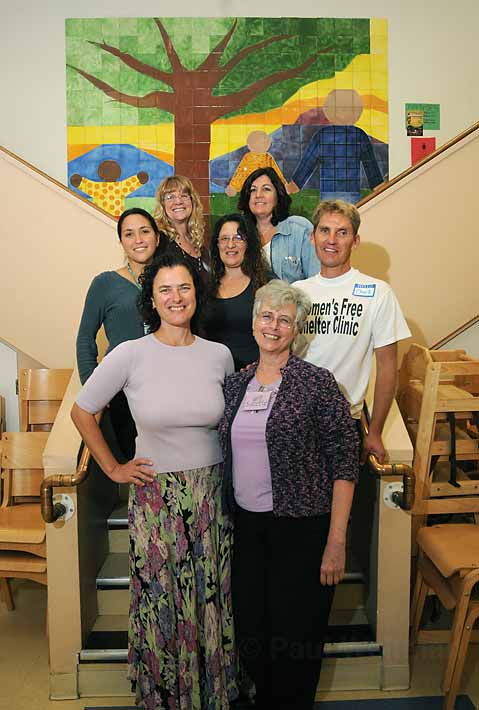New Clinic Caters to Homeless Women
The Women's Free Shelter Clinic Aims to Comfort Clients
No matter how small or picturesque the town is, the dangers of homelessness are multiplied for women. Unsheltered homeless women are both product and prey, desperate for protection but forced to give themselves away to get it. A homeless woman in a shelter is better off, but still not exactly safe.
It was this reality that inspired three Santa Barbara nonprofits to create a venue for homeless women to take care of themselves. Last year Santa Barbara Street Medicine, Planned Parenthood, and Transition House came up with the idea for a biweekly walk-in clinic and day center with confidential reproductive health services, counseling, shower facilities, laundry, child care, and lunch. Transportation-always an obstacle for the homeless-is furnished as well. Operating out of Transition House, the Women’s Free Shelter Clinic had its first day of service on Friday, December 12.

There was a sense of hushed excitement as volunteers-who outnumbered clients-showed five women around the various stations and explained procedures. One woman, who didn’t want her name or age to appear in print, explained that she had become homeless on November 1, when her social security disability benefits were erroneously discontinued. After staying with friends, she worried she was wearing her welcome out, and moved into Casa Esperanza, where she’s been for more than two weeks. On Friday, just before noon, she was enjoying a bowl of chicken soup at the clinic while waiting to speak with a counselor. And she was relaxing, just as clinic organizers hoped that she would.
Mimi Doohan, a family practice physician and director of Santa Barbara Street Medicine, said the idea was to create a comfortable environment for women to have reproductive exams. And indeed, the shelter, which normally serves homeless families, has a casual homey atmosphere. A stack of clean towels and rows of miniature shampoo and sunscreen bottles filled one of the tables. The whirr of a washing machine could be heard from the next room.
For the first few months, reproductive services will be limited to what Planned Parenthood dubs “express exams.” They include birth control and testing for sexually transmitted diseases (STDs) without that physical exam many women find intimidating. Within a few months though, the clinic will ramp up to a full-service Planned Parenthood satellite clinic, capable of gynecological exams and the more invasive birth control device Implanon, which is surgically inserted under the skin and lasts for three years.
“We really wanted to look beyond our four walls and work collaboratively with more community-based organizations,” said Pat Fajardo, Planned Parenthood’s vice president of clinical services. “I’m all about increasing access, and this population is nontraditional. They have special needs.” Planned Parenthood is providing all the birth control free of charge, as well as a nurse practitioner and someone to do intake and medical histories.
Tamara Tiffany, another client and temporary resident of Casa Esperanza, looked happy after finding a bagful of clothes that fit and a new pair of shoes. She came for birth control. She and her husband were evicted from their Upper State Street apartment six month ago, and have been staying in separate shelters ever since. Though, she said, they were moving to Palm Desert that very afternoon. Tiffany also got tested for a handful of STDs.
The shelter runs from 10 a.m. to 3 p.m. every second and fourth Friday of the month. Doohan, along with her many volunteers, began handing out cards to homeless women earlier in the week, with information on the clinic’s hours and services and locations where an Easy Lift transportation van will be stopping for round-trip transportation.
Annette Perez, Transition House’s director of operation, was making sure everything was running smoothly. She said the shelter was 100 percent supportive of the new clinic. “Anything that will help our population is a positive thing.”



